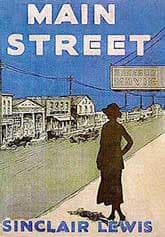Main Street
 First edition
First editionFirst book publication
1920, United States
Literature form
Novel
Genres
Literary
Writing language
English
Author's country
United States
Length
approx. 168,000 words
Return of the old mainstream
Life in smalltown America has long been celebrated or satirized in fiction, but seldom as comprehensively or as pointedly as in Sinclair Lewis's first great novel, some would argue his greatest work.
The impact of Main Street has been such that its very title has become a catchphrase to represent a certain kind of existence and set of values. The phase had been around for decades earlier but Main Street popularized it
After the book's publication in 1920 and its popularity, the connotations of that phrase were largely negative. This reflects the perspective of the novel's protagonist Carol Kennicott who moves to Gopher Prairie with her doctor husband and finds town life to be dull, desolate and uncultured. A supposed progressive, she butts her head against the populace's stubborn conformity and their backward views, especially in their attitude toward the place of women.
Over time the phrase "main street" has changed to take on more positive implications. It now more often refers to where locals socialize, small businesses peddle their wares, and traditional values of honesty, hard work and neighbourliness thrive. When politicians go mainstreeting—in towns or cities of any size—they're out greeting the common people, what some would call Middle America.
Thorough failure
In a way, this flipping of main street's connotations is consistent with the novel of Main Street. If anyone thought the controversy raised by the author's criticism of smalltown life would help bring about change any time soon, they need only consult the end of the novel. After years of continual efforts to improve Gopher Prairie, Carol admits to her half-listening husband she has thoroughly failed. She hasn't given up—it's her nature to keep fighting—but she knows radical change is not coming in her lifetime.
It is difficult to entirely sympathize with her though. Lewis has not created a one-dimensional heroine. She acknowledges at the end she has not always "fought the good fight". We can recall along the way she has expended energy on some pretentious projects designed to spread her ideas of culture to the masses.
As a doctor's wife, she is automatically part of the local social elite and most of her efforts in organizing townsfolk are wasted in their rarefied circles, trying to move the ruling cliques to change their ways. We know most inhabitants of Gopher Prairie must be working class and farm labourers, but she spends little time with them, apart from a couple of poor families she patronizes until they disappoint her.
'A-ha' moments
All this must make Main Street sound as bleak a read as some critics have accused it of being. But Lewis is a fascinating writer. He's not nearly the stylist that many of his contemporaries are. He's no Scott Fitzgerald, Ernest Hemingway, or even a John O'Hara. Yet his clever prose, his engaging dialogue and his feel for setting move the story along.
I don't get his reputation for being humorless as he's got a light touch, even in the heaviest passages. I'm chortling all the way through Main Street—both times I've read it—though I have to admit the laughter is less of the "ha ha" than of the "a-ha" variety. Carol Kennicott both delights and exasperates. And ultimately inspires.
Is Main Street still relevant or is it irredeemably an artefact of an historical period, worth reading only to understand how part of the world used to be back then?
I don't recognize much of Gopher Prairie or its residents in some of the villages, towns and small cities I have known. But some elements do spark moments of recognition. Some of the characters certainly do.
Main Street is one of Sinclair Lewis's novels that keeps going in and out of style. I'm betting this will continue for a few years yet.
— Eric

